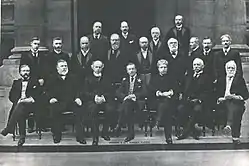1902 Colonial Conference
The 1902 Colonial Conference followed the conclusion of the Boer War and was held on the occasion of the coronation of King Edward VII. As with the previous conference, it was called by Secretary of State for the Colonies Joseph Chamberlain who opened it on 30 June 1902.[1]
| 1902 Colonial Conference | |
|---|---|
 Front row left-right: Sir Robert Bond (Premier of the Newfoundland Colony), Richard Seddon (Prime Minister of New Zealand), Sir Wilfrid Laurier (Prime Minister of Canada), Joseph Chamberlain (Secretary of State for the Colonies (Chairman)), Sir Edmund Barton (Prime Minister of Australia), Sir Albert Henry Hime (Prime Minister of Natal), Thomas Fuller (Agent-General for Cape Colony) | |
| Host country | |
| Dates | 30 June–11 August 1902 |
| Cities | London |
| Heads of Government | 7 |
| Chair | Joseph Chamberlain (Secretary of State for the Colonies) |
| Follows | 1897 |
| Precedes | 1907 Imperial Conference |
| Key points | |
Imperial defence, imperial council, customs union, Imperial Preference | |
Chamberlain used the occasion to resubmit his earlier proposals made at the 1897 Colonial Conference for an Imperial Council made up of colonial representatives which would act as a quasi-Imperial Parliament and make decisions for the colonies on imperial policy. This proposal, along with Chamberlain's idea for a unified imperial defence scheme, was rejected by most of the colonial prime ministers. While New Zealand proposed that each colony provide a special force for imperial defence in the case of war, Canada and Australia both believed this idea undermined self-government.[2]
Chamberlain also proposed an imperial economic union or customs union with free trade within the empire and tariffs against goods from outside of it. The colonies, however, passed a resolution rejecting imperial free trade. A resolution in favour of imperial preference as proposed by Canada was approved and Chamberlain agreed to bring the idea to the British government. However, this plan was not implemented until the British Empire Economic Conference in 1932.[2] Britain had more liberal trade policies than the colonies, making it hard for the British to adopt imperial preference policies without undermining its trade agreements with foreign states.[3]
Theodore H. Boggs, an advocate for imperial federation, described the outcome of the conference as "disappointing."[3]
Participants
The conference was hosted by King Edward VII, with his Colonial Secretary and the premiers of various colonies or their representatives and members of their cabinets:
See also
References
- "The Conference of Colonial Premiers". The Times. No. 36808. London. 1 July 1902. p. 6.
- Historical dictionary of European imperialism. Greenwood Publishing Group. 1991. p. 138. ISBN 0313262578.
- Boggs, Theodore H. (1916). "The British Empire and closer union". American Political Science Review. 10 (4): 635–653. doi:10.2307/1946822. ISSN 0003-0554.
- Papers relating to a conference between the secretary of state for the colonies and the prime ministers of self-governing colonies; June to August, 1902
- "The Life an Work of Richard John Seddon". nzetc.victoria.ac.nz. Retrieved 24 July 2017.